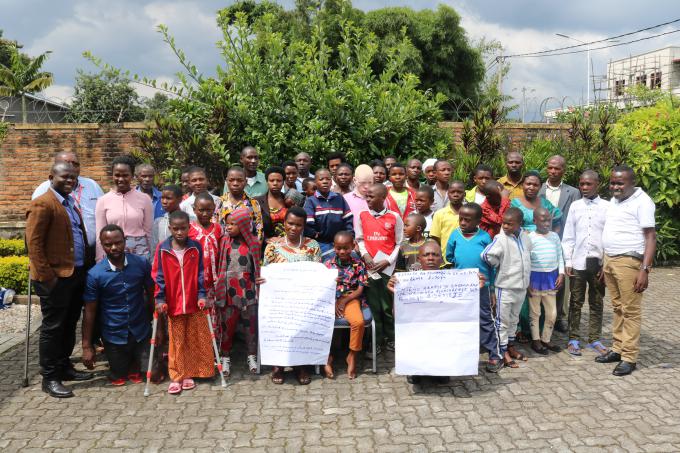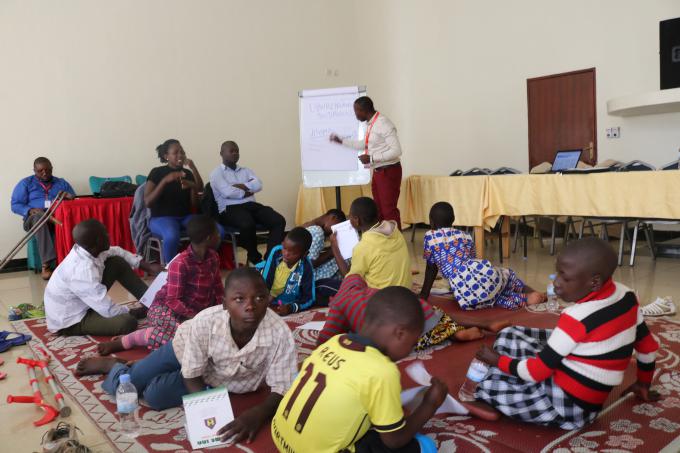Excluding children with disabilities is discrimination – all children have rights!
Save the Children is the largest independent child rights organisation, with a vision in which every child attains the right to survival, protection, development and participation and mission to inspire breakthroughs in the way the world treats children, and to achieve immediate and lasting change in their lives. With our implementing partner UWEZO Youth Empowerment we work closely with the youth and children with disability (Y/CWD) to promote the implementation of the State obligations and commitments to the United Nations Convention on the Rights of Children (UNCRC) and the United Nations Convention on the Rights of Persons with Disability (UNCRPD). This project pilots a new approach to evidence-based advocacy for and by a new generation of Y/CWD in Rwanda and support them in expressing themselves on how they see the fulfilment of their rights at grassroots levels and how they enjoy them in different settings such as home, school, institutional care, rehabilitation centres etc. The project is implemented in three districts - Gasabo, Kicukiro, and Musanze with awareness raising activities on disabilities and the UNCRPD and UNCRC and related commitments for community members, women and men, and decision makers.
From the 20th – 26th of February 2020 Save the Children in partnership with UWEZO organised a training of Children and Youth with Disabilities on the UNCRC and UNCRPD across the 3 targeted districts. These training sessions are organized to increase capacities of CYWDs on their rights according to international instruments which have both been ratified by the government of Rwanda and the local and national initiatives to address the many challenges faced by children/persons with disability.
These trainings saw Children with disabilities, their parents and guardians, local officials from Gasabo, Kicukiro and Musanze Districts over the course of 4 days with the aim of raising awareness on children with disabilities’ rights, and identify specific issues for advocacy for the improvement in access to education and employment of C/YWDs. Seeing as this is an inclusive project, participants were chosen by taking into consideration the diversity of disability-making sure that all forms of disabilities are represented. Participants included 23 youth with disabilities (YWDs) including 8 Uwezo Youth Mentors in Jari and Rusororo sectors (Gasabo District) and Kigarama and Niboye sectors (Kicukiro District); 30 YWDs including 4 Uwezo Youth Mentors from Busogo and Muko sectors (Musanze district); 21 Children with disabilities (CWDs) a combination boys and girls 9 years and above enrolled in the two selected schools in Musanze district including CWDs representing CWDs in children’s forums at cell, sector and district level. Also, in attendance were 3 District officers in charge of Disability Mainstreaming, Gender and Family Promotion and Education to be able to share with CYWDs available education and employment opportunities for CYWDs in the targeted districts.
Save the Children’s team responsible for the Child Protection efforts at country office spoke to participants on the rights of the Child in general and the rights of children with disabilities in the context of Rwanda as well as invited sharing on recommendations for advocacy objectives. From this session children began to share on how they have felt mistreated and marginalized in the community and at schools because of their disabilities.
“While a child with disability is at school, they are not treated as a normal person by their peers, they tend to think because of the disability then you are an idiot, they insult and call you with degrading names. We face may hidden challenges, which, many people are not aware of, for instance, when I go to the market to buy clothes, the seller does not allow me to try it on, in the pretext that I will make it dirty because of my albinism” Said Pacifique, a child with albinism
Many other children in the training also shared Pacifique’s views that they too are still facing discrimination, stigma and they are denied many of their rights in society, including access to education. In addition, many of children who have siblings without a disability said that their parents show favouritism to their able-bodied siblings and denying them certain rights which in turn limits their access to education and social interactions skills.
Some of the parents present in the training shared that they too have been guilty of not prioritising their children’s needs due to lack of information and knowledge around the rights of children with disabilities. “I have many times beaten my child who was born with visual impairments, his father also left me due to that reason, after I became more consciously aware, I came to realise that no child chose to be born with disability. After this training I have acquired more knowledge and understanding and I promised myself to no longer behave in such judgemental way” Nyiramana testified, a Parent
After the training, parents vowed to be at the forefront of their children’s development and work to let go of their negative stereotypes that affect their children at home and in the community. “This training has been helpful to me, I have learnt many things relating to my child’s rights, I have unwittingly been mistreating my child, for instance, if I want to buy health insurance and I do not have enough money, those ones without disability are priority, the same as school fees and other many things. This will not happen again; I have learnt that a child with disability need more attention even than a child without disability” Mukeshimana said, a parent
The children and their parents called upon a consistent awareness initiative around the rights of children and children with disability in Rwanda.
The UNCRPD marks a ‘paradigm shift’ in attitudes and approaches to persons with disabilities. Addressing – persons/children with disabilities are not viewed as "objects" of charity, medical treatment and social protection; rather as "subjects" with rights, who are capable of claiming those rights and making decisions for their lives based on their free and informed consent as well as being active members of society.The Convention also gives universal recognition to the dignity of persons with disabilities. Save the Children is working to support the child and family to understand and accept disability, work with service providers and community to not discriminate/ exclude and work to remove physical barriers to services/ facilities/ access points, refer rehabilitation related needs to relevant service (including community level) and provide training for everyday living skills. In 2019-21 we aim to bring greater focus to our work with girls, children with disabilities, and adolescents, and build up our knowledge and expertise in these areas.
Disability is not inability!
 Rwanda
Rwanda 
